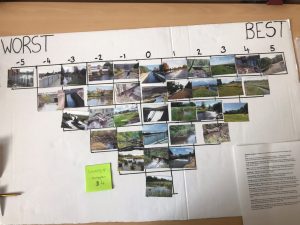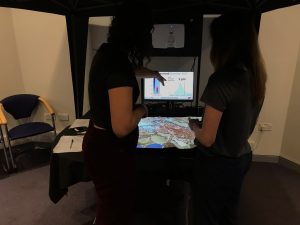
July 7, 2021, by lzzeb
Public perceptions of flood management options and my Research Masters experience
A blog by Mikaela D’Souza
I undertook both a BSc Geography degree (graduated 2018) and Research Masters (graduated 2020) in the School of Geography at the University of Nottingham. My Research Masters supervised by Chris Ives and Matt Johnson, investigated ‘Public Perceptions of Flood Management Schemes in the UK’ and was recently published in the Journal of Environmental Management, found here. The research highlights how people’s values can influence their perceptions of flood management options. Through questionnaires and interviews, people’s preferences for flood management schemes were explored and related to the underlying values that characterise what is important to them in life, such as caring for the environment or upholding traditions. I also undertook a Q-method, where respondents had to rank photographs of different flood management options ranging from green infrastructure, including wetlands and tree planting, to hard engineering, including dams, based on their effectiveness, aesthetics, and benefit to wildlife.

Image of a Q-sort, where people were asked to rank images of flood management methods from best to worst based on criteria including their design purpose, aesthetics and benefits to wildlife.
The research found that green infrastructure was preferred when it came to the appearance and benefits to wildlife of management schemes, but not when it comes to mitigating flooding. The Q-method results produced three gradients of preference from least to most preferred: engineered-natural, messy-neat and grey-green. Furthermore, it was found that peoples values predict their preferences for different flood management options. The research highlights that river and catchment managers should consider how they are communicating messages regarding flood schemes and find ways that resonate with a diverse set of public views.

Me undertaking interviews with respondents, with visual aids, to determine their values and opinions on flood management options.
Since graduating in 2020, I started working for Devon County Council (DCC) as an Assistant Flood and Coastal Risk Officer. I started at DCC in July 2020 where I was seconded from the University of Exeter internship scheme as a Flood and Coastal Risk Management Graduate. I began my permanent role in the team in May 2021. My masters degree was invaluable in providing me with skills needed to perform my job, not only from the knowledge learnt, but also the skills I developed. In particular, time management, self-motivation and individual working were an important part of my masters and are also necessary in my role at DCC, especially due to working from home during the pandemic. Furthermore, during my masters I had the opportunity to present my Masters work at a conference, plus numerous assignments during my undergraduate degree aimed at communication science, which provided me with an important foundation for my current job, which requires me to regularly speak with members of the public and other stakeholders and communicate sometimes complex messages to them.
I thoroughly enjoyed my time at the University of Nottingham and benefitted from some life-changing experiences, particularly going on the Mount St Helen’s field course. Many of my friends have also gone onto work in the area of environmental management, including at the National Farmers Union and environmental consultancies, and it great to have a network of friends with similar careers and interests, with whom I can compare ideas and thoughts.
No comments yet, fill out a comment to be the first

Leave a Reply